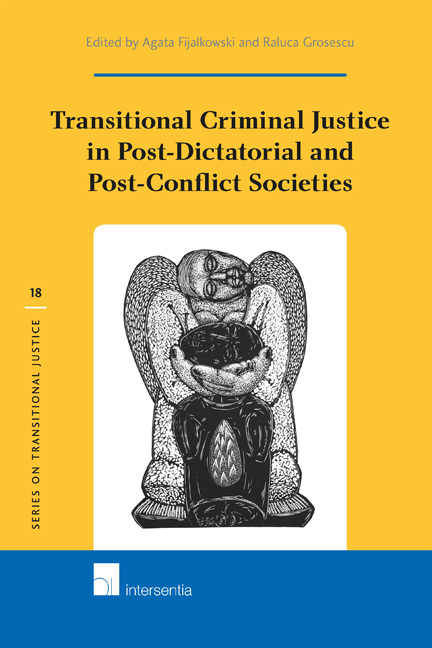Book contents
- Frontmatter
- Contents
- Introduction
- PART I CRIMINAL JUSTICE AS A METHOD OF DEALING WITH THE PAST: OPPORTUNITIES, STRATEGIES, AND LEGAL AND POLITICAL CONSTRAINTS
- PART II UNIVERSAL PRINCIPLES V LOCAL PECULIARITIES: THE RELATIONSHIP BETWEEN NATIONAL JURISDICTIONS AND INTERNATIONAL LAW
- Chapter 7 International Politics of Justice: The Political Underpinnings of the Emergence of an International Regime
- Chapter 8 Positive Complementarity: Fine-Tuning the Transitional Justice Discourse? The Cases of the Democratic of Congo, Uganda and Kenya
- Chapter 9 Punishing Mass Atrocities: Penological Developments in the Aftermath of the Rwandan Genocide
- Chapter 10 International and National Legal Assessment of Crimes Committed by the Communist Regimes: Lithuanian Case Study
- Chapter 11 Conclusions
- About the Authors
Chapter 8 - Positive Complementarity: Fine-Tuning the Transitional Justice Discourse? The Cases of the Democratic of Congo, Uganda and Kenya
from PART II - UNIVERSAL PRINCIPLES V LOCAL PECULIARITIES: THE RELATIONSHIP BETWEEN NATIONAL JURISDICTIONS AND INTERNATIONAL LAW
Published online by Cambridge University Press: 28 November 2017
- Frontmatter
- Contents
- Introduction
- PART I CRIMINAL JUSTICE AS A METHOD OF DEALING WITH THE PAST: OPPORTUNITIES, STRATEGIES, AND LEGAL AND POLITICAL CONSTRAINTS
- PART II UNIVERSAL PRINCIPLES V LOCAL PECULIARITIES: THE RELATIONSHIP BETWEEN NATIONAL JURISDICTIONS AND INTERNATIONAL LAW
- Chapter 7 International Politics of Justice: The Political Underpinnings of the Emergence of an International Regime
- Chapter 8 Positive Complementarity: Fine-Tuning the Transitional Justice Discourse? The Cases of the Democratic of Congo, Uganda and Kenya
- Chapter 9 Punishing Mass Atrocities: Penological Developments in the Aftermath of the Rwandan Genocide
- Chapter 10 International and National Legal Assessment of Crimes Committed by the Communist Regimes: Lithuanian Case Study
- Chapter 11 Conclusions
- About the Authors
Summary
The chapter analyses whether, and if so to what extent, the policy of positive complementarity promoted by the Office of the Prosecutor of the ICC has the potential to enhance and refine the capacity of national systems to respond to massive violations of human rights. To this effect, the chapter firstly provides a comprehensive reading of complementarity. In this context, it assesses how alternative forms of justice are reconciled with the functioning and authority of the ICC. Subsequently, the chapter critically evaluates the performance of the permanent Court vis-à-vis the situation in the Democratic Republic of Congo, Uganda and Kenya insofar as these countries presented proposals, and/or undertook efforts arguably intended to maintain jurisdiction that were not exhaustively considered by the ICC Prosecutor. Concluding, the chapter highlights the potential of positive complementarity to uphold the transitional justice discourse were the Office of the Prosecutor to reconsider its approach, in the effort of consolidating the ICC system and avoiding frictions that may fragment the international criminal law order.
UNDERSTANDING POSITIVE COMPLEMENTARITY
‘Transitional justice’ is a chapeau concept that refers to a range of approaches, mechanisms and comprehensive strategies that are used in post-dictatorial and post-conflict societies, in order to address gross human rights violations. It includes judicial and non-judicial solutions. In keeping with this view, the question this chapter aims to respond to is whether positive complementarity enhances and promotes the capabilities of national systems to effectively respond to massive atrocities. But what does an ‘effective domestic system’ mean in this context? It is often argued that when massive crimes are at stake, an effective response is not necessarily one that involves criminal investigation, prosecution and punishment. While this might be true in general, the Statute of Rome is undoubtedly concerned with criminal justice. National reconciliation, peace and security, and the historical truth may be incidental - and certainly desirable - effects of criminal proceedings but they are not integral to the ICC's mandate nor do they weigh the most as far as the decision-making of the Court's organs is concerned.
- Type
- Chapter
- Information
- Publisher: IntersentiaPrint publication year: 2015



